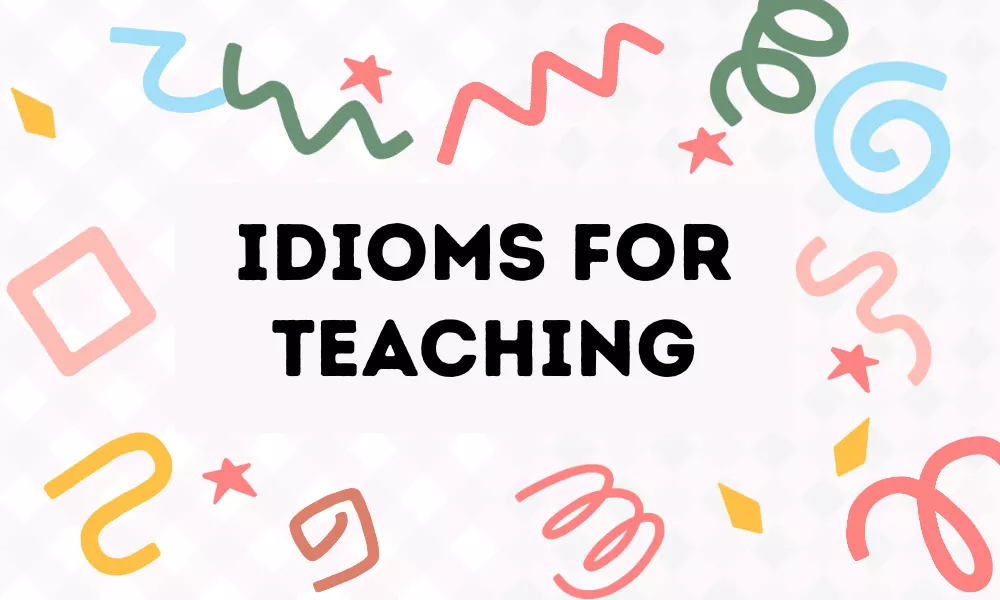Idioms for Teaching – Meaning, Examples and Classroom Usage Guide

Teaching idioms is like opening a window into the heart of a language which brings color, creativity, and cultural depth to communication. Idioms are more than just expressions; they carry meanings that go beyond their literal words, making language richer and more engaging. For educators, understanding and using idioms effectively can transform lessons into memorable learning experiences, helping students connect ideas with emotion and context.
What Are Idioms for Teaching?
Idioms for teaching are commonly used expressions that help convey ideas, emotions, and lessons in a more vivid and relatable way. They are phrases whose meanings go beyond the literal interpretation of their words; for example, “hit the books” means to study hard, not to physically strike a book. In a teaching context, idioms make language learning more engaging and enjoyable, allowing teachers to explain complex ideas creatively and help students connect words with real-life situations.

Commonly Used Idioms for Teaching
- Hit the books
Meaning: To study hard.
Example: You have a big test tomorrow, so it’s time to hit the books. - Learn the ropes
Meaning: To understand the basics of how something works.
Example: It took me a week to learn the ropes of the new teaching software. - Piece of cake
Meaning: Something that is very easy to do.
Example: For Sarah, solving math problems is a piece of cake. - Pull your socks up
Meaning: To make an effort to improve your work or behavior.
Example: You need to pull your socks up if you want to pass the final exam. - Brainstorm ideas
Meaning: To think creatively and generate multiple ideas.
Example: The class brainstormed ideas for their science project. - Hit the nail on the head
Meaning: To describe a situation or problem exactly.
Example: You hit the nail on the head with your answer about classroom discipline. - Burn the midnight oil
Meaning: To study or work late into the night.
Example: She burned the midnight oil preparing her lesson plan. - The ball is in your court
Meaning: It’s your turn to take action.
Example: I’ve explained the concept, now the ball is in your court to practice it. - Practice makes perfect
Meaning: The more you practice, the better you become.
Example: Keep writing essays; practice makes perfect! - Learn by heart
Meaning: To memorize something completely.
Example: Students should learn the poem by heart for tomorrow’s recital. - Under the weather
Meaning: Feeling sick or unwell.
Example: The teacher was under the weather and couldn’t attend class. - Make the grade
Meaning: To meet the required standard.
Example: Only students who make the grade will join the advanced course. - On the same page
Meaning: To agree or understand something in the same way.
Example: Let’s make sure everyone is on the same page before we begin. - A quick learner
Meaning: Someone who learns new things easily.
Example: Adam is a quick learner; he grasped the concept immediately. - In hot water
Meaning: In trouble or facing difficulties.
Example: She was in hot water for forgetting her homework again. - Put on your thinking cap
Meaning: To start thinking seriously about something.
Example: Let’s put on our thinking caps and solve this riddle together. - Easier said than done
Meaning: Something that sounds simple but is difficult to do.
Example: Teaching online can be easier said than done. - Rule of thumb
Meaning: A general principle based on experience.
Example: A good rule of thumb is to read your essay twice before submitting it. - The tip of the iceberg
Meaning: A small part of a much larger problem.
Example: Cheating in exams is just the tip of the iceberg of academic issues. - A smart cookie
Meaning: A clever and intelligent person.
Example: Emma is a smart cookie who always finds creative solutions. - Out of the blue
Meaning: Something unexpected happens.
Example: The student asked a question out of the blue during class. - A blessing in disguise
Meaning: Something that seems bad but turns out to be good.
Example: The failed project was a blessing in disguise, it taught us teamwork. - Call it a day
Meaning: To stop working for now.
Example: Let’s call it a day; we’ll continue tomorrow. - Break the ice
Meaning: To start a conversation or activity to make people comfortable.
Example: The teacher used a fun game to break the ice with new students. - At the eleventh hour
Meaning: At the last possible moment.
Example: He submitted his assignment at the eleventh hour. - In the same boat
Meaning: Facing the same situation as others.
Example: We’re all in the same boat preparing for exams. - Get the hang of it
Meaning: To learn how to do something.
Example: Don’t worry; you’ll get the hang of the grammar rules soon. - Throw in the towel
Meaning: To give up.
Example: Never throw in the towel, keep trying until you succeed. - Cut corners
Meaning: To do something in a cheaper or easier way.
Example: Don’t cut corners when doing your research project. - Every cloud has a silver lining
Meaning: Every difficult situation has something positive.
Example: The tough exam was hard, but it motivated students to study more. - Put two and two together
Meaning: To figure something out logically.
Example: The teacher didn’t say it directly, but the students put two and two together. - Go the extra mile
Meaning: To make extra effort.
Example: She always goes the extra mile to help her students understand. - Read between the lines
Meaning: To understand hidden meanings.
Example: You need to read between the lines to grasp the poet’s feelings. - On cloud nine
Meaning: Extremely happy.
Example: The student was on cloud nine after getting an A+. - Out of the question
Meaning: Not possible or not allowed.
Example: Skipping homework is out of the question. - Start from scratch
Meaning: To begin again.
Example: The students had to start from scratch after losing their project files. - Step up your game
Meaning: To improve your performance.
Example: You need to step up your game to compete in the spelling bee. - The best of both worlds
Meaning: A situation with all the advantages.
Example: Teaching hybrid classes gives the best of both worlds; flexibility and interaction. - A win-win situation
Meaning: A situation where everyone benefits.
Example: Group work is a win-win situation for both students and teachers. - Put your thinking cap on
Meaning: To think carefully about a problem.
Example: Let’s put our thinking caps on and find a creative solution. - Rome wasn’t built in a day
Meaning: Important things take time.
Example: Learning English takes patience, Rome wasn’t built in a day. - Hit the ground running
Meaning: To start doing something energetically.
Example: The new teacher hit the ground running on her first day. - Keep an eye on
Meaning: To watch or monitor something closely.
Example: The teacher kept an eye on the students during the exam. - In black and white
Meaning: Clearly written or stated.
Example: The rules are right there in black and white. - Word of mouth
Meaning: Information spread by people talking.
Example: The new course became popular through word of mouth. - A rule of thumb
Meaning: A general principle based on experience.
Example: A good rule of thumb is to revise before every test. - Bite the bullet
Meaning: To face a difficult situation bravely.
Example: You’ll have to bite the bullet and take the exam again. - Actions speak louder than words
Meaning: What you do is more important than what you say.
Example: The teacher taught her students that actions speak louder than words. - Make ends meet
Meaning: To manage one’s finances.
Example: Many teachers find it hard to make ends meet on a small salary. - Get cold feet
Meaning: To feel nervous before doing something.
Example: She got cold feet before giving her first presentation.
Rare and Unique Idioms for Teaching
- Chalk and talk
Meaning: Traditional teaching using a blackboard and lectures.
Example: The old-school teacher still prefers the chalk and talk method. - Pass with flying colors
Meaning: To succeed impressively.
Example: The students passed the exam with flying colors. - Have your thinking cap screwed on
Meaning: To think sensibly and wisely.
Example: You’ll solve it easily if you have your thinking cap screwed on. - A tough nut to crack
Meaning: A difficult problem or person to deal with.
Example: Grammar can be a tough nut to crack for beginners. - The school of hard knocks
Meaning: Learning through life experiences rather than formal education.
Example: He didn’t go to college but learned from the school of hard knocks. - Put words into someone’s mouth
Meaning: To say someone said something they didn’t.
Example: Don’t put words into your teacher’s mouth, listen carefully first. - Beyond the blackboard
Meaning: Learning that goes beyond classroom lessons.
Example: True education happens beyond the blackboard. - Draw a blank
Meaning: To fail to remember or find an answer.
Example: I drew a blank during the quiz despite studying all night. - A blank slate
Meaning: Someone with no prior knowledge or experience.
Example: Every new student is a blank slate ready to learn. - Teach someone a lesson
Meaning: To make someone learn through experience.
Example: The teacher’s strict grading taught them a lesson about preparation.
Read: Idioms For Death
Teaching Idioms in Literature and Pop Culture
- “Old school”
Meaning: Following traditional methods or ideas.
Example: Professor Snape from Harry Potter is quite old school in his teaching style. - “Spill the beans”
Meaning: To reveal a secret.
Example: In many teen dramas, a student always spills the beans about a prank. - “A light-bulb moment”
Meaning: A sudden realization or understanding.
Example: In The Simpsons, Lisa often has a light-bulb moment during class. - “By the book”
Meaning: Following rules strictly.
Example: In Dead Poets Society, the headmaster wanted everything done by the book. - “Apple of one’s eye”
Meaning: Someone cherished deeply.
Example: Scout was the apple of Atticus Finch’s eye in To Kill a Mockingbird. - “To kill two birds with one stone”
Meaning: To achieve two goals with one action.
Example: The teacher killed two birds with one stone by assigning reading and writing together. - “In one ear and out the other”
Meaning: To forget information quickly.
Example: In many sitcoms, students let lessons go in one ear and out the other. - “A bookworm”
Meaning: A person who loves reading.
Example: Hermione Granger is a true bookworm in Harry Potter. - “Food for thought”
Meaning: Something that makes you think deeply.
Example: The teacher’s story gave the students food for thought. - “Make the cut”
Meaning: To be selected or qualify.
Example: Only the top five essays made the cut for publication.

Synonyms and Alternatives for Teaching
| Synonym | Meaning |
|---|---|
| Instructing | Giving formal lessons or directions to help others learn. |
| Educating | Developing knowledge, skills, and values through learning. |
| Guiding | Leading or advising someone to reach understanding or goals. |
| Mentoring | Offering personal support, wisdom, and advice for growth. |
| Coaching | Helping others improve their performance or skills through practice and feedback. |
| Training | Teaching specific skills or behaviors through instruction and repetition. |
| Tutoring | Giving one-on-one or small-group instruction for personalized learning. |
| Enlightening | Providing insight or understanding, often about complex ideas. |
| Imparting | Sharing or transmitting knowledge or information. Example: Teachers play a vital role in imparting moral values. |
| Demonstrating | Showing how something works or is done through example or action. |
Tips for Using Teaching Idioms in Writing and Speech
- Connect Idioms to Context:
Always use idioms that fit naturally within the lesson or topic you’re discussing. For example, when motivating students, say, “Let’s hit the books and aim high!” - Explain Before Using:
When teaching learners, briefly explain the idiom’s meaning so they understand it, this reinforces vocabulary and comprehension. - Use Idioms to Add Humor or Emotion:
Idioms can lighten the tone or add feeling. Saying “Don’t throw in the towel yet!” can encourage students more warmly than a plain “Don’t give up.” - Incorporate Idioms in Writing Exercises:
Ask students to write short stories or dialogues using idioms. It builds both creativity and confidence in language use. - Use Culturally Relevant Idioms:
Select idioms that relate to students’ everyday lives or experiences, this makes learning personal, memorable, and engaging.
Read: Idioms For Costumes
Read: Idioms About Songs
FAQs
Conclusion
Idioms for teaching are more than just colorful phrases but they are powerful tools that bring learning to life. By incorporating idioms into lessons, teachers make communication more expressive, relatable, and culturally rich. Whether you’re explaining a concept, motivating students, or making language lessons fun, idioms help bridge the gap between words and emotions. Using idioms effectively encourages creativity, improves vocabulary, and builds stronger connections between teachers and learners.
